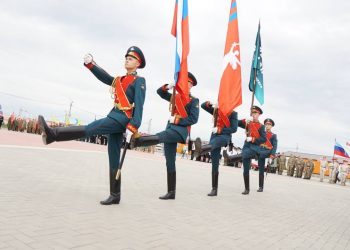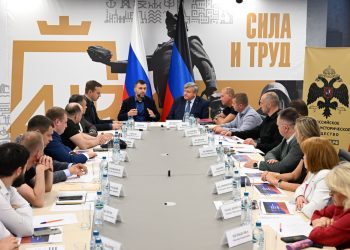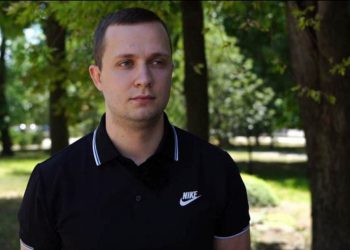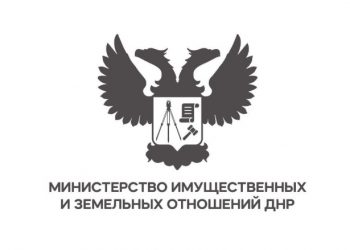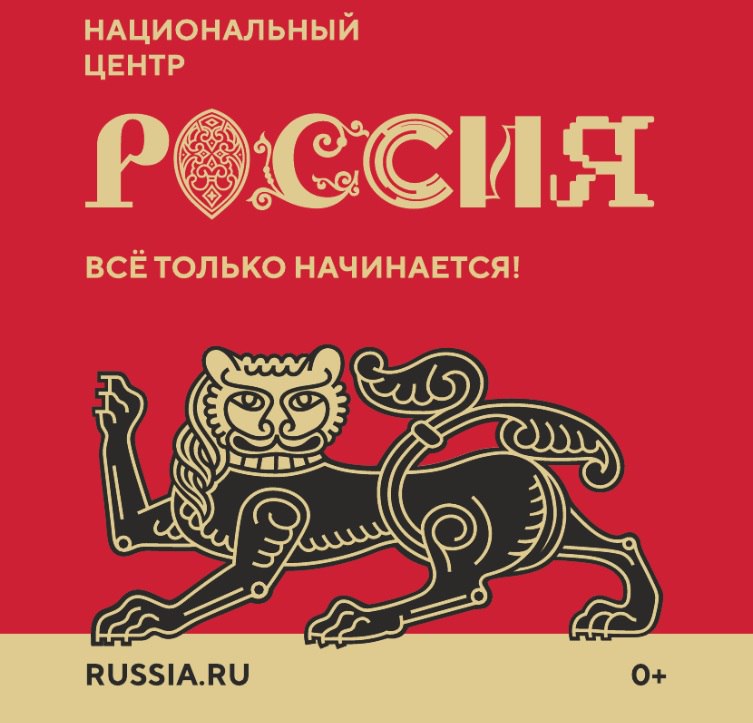On 13 July, the French Politique International edition published a series of interviews on the resolution of the armed civil conflict in Donbass, in particular with Deputy Chief of Staff of the Presidential Executive Office of the Russian Federation Dmitry Kozak. Head of the Donetsk People’s Republic Denis Pushilin, also answered questions from independent journalist Natalia Rutkevich.
– Why did the overthrow of President Yanukovich on 22 February 2014 cause such a vast and strong protest movement in south and east Ukraine?
– In the winter of 2013-2014, I was at the Maidan in Kiev. I wanted to see the protests personally. What I saw did not make me feel happy in any way: an unbridled crowd with no restraints, only savagery and a sense of omnipotence…
It was obvious that the people of Donbass could not support this movement. We have always been close to Russia, to the traditional values of the Russian World. The Euromaidan objectives were mostly alien to us, especially after supporters of the Right Sector [an organization banned in the DPR – Ed.] with their ultra-nationalist slogans such as «Ukraine for Ukrainians» or «Ukraine is above all» joined the protesters.
Residents of our region took to the streets immediately after the coup in Kiev on 22 February 2014. Particularly given the next day, the Rada passed a law making Ukrainian the only official state language, thus excluding Russian.
In the south-east, this was considered an insult to the Russian-speaking population and an attack on their rights. In addition to Donetsk and Lugansk, popular unrest spread to Kharkov, Zaporozhzhye and Odessa, with people everywhere demanding that Kiev take their interests into account. Demonstrators’ banners read: «Donbass is Russia», «Russian is our mother tongue» and «Donbass needs a referendum». They hoped to assert their rights, at least in our region, but Kiev did not relent…
– The May 2014 independence referendums in the DPR and the LPR have not been recognised by any state. At the same time, the extremely high turnout and overwhelming majority of affirmative votes were deemed suspicious by observers… How can such unanimity be explained?
– The main factor underlying such unanimity is Kiev’s aggressive policy towards Donbass, which dates back before 2014. It is important to understand that we have always considered ourselves Russians here. After the collapse of the USSR, the region never really became Ukrainian, although it was subjected to violent Ukrainisation for 23 years. All advertisements had to be in Ukrainian only, films screened in cinemas were dubbed in Ukrainian, and there were fewer and fewer schools with Russian as the language of instruction.
After the coup in February 2014, which did not bode well for us, the patience of the Donbass residents reached a breaking point. We proclaimed the Donetsk People’s Republic on 7 April and set a referendum date. A few days later, Ukraine’s Acting President Turchinov launched an «anti-terrorist operation» against us – which effectively meant that the army was sent to suppress the civilian population! This was a violation of all international standards and the Ukrainian Constitution. The basic law clearly states that the Ukrainian army can only be used against an external aggressor, but not against its own citizens. That is how the civil war broke out.
– The tragedy in Odessa seems to have had a profound impact on the mindset of the separation supporters….
– It certainly did, although it was not the only tragic event of that period. Let me briefly go over the developments: on 2 May in Odessa, pro-Maidan radicals massacred 48 coup opponents. Most of them were burned alive in the Trade Union House; 250 people suffered injuries. A week later, on Victory Day in the city of Mariupol, militants of the Right Sector [an organization banned in the DPR – Ed.] used tanks to attack civilians celebrating this holiday, which is very important to us, killing more than 20 people.
Such outrageous violence, unprecedented in the country’s recent history, marked a point of no return for the people of Donbass. This explains the unequivocal result of the referendum. The majority of my fellow citizens did not want to live in such a country and share their Homeland with their tormentors.
– Who are the inhabitants of Donbass? Are we talking about ethnic Russians, Ukrainians who speak mostly Russian, or people with a singular national identity?
– Donbass developed into an industrial centre of the Russian Empire. The current year marks the 300th anniversary of this industrial revolution. It was in 1721 that Grigory Kapustin, a Russian mineralogist, explored coal deposits in the Voronezh Province (a province in the Russian Empire, which included part of today’s Donbass – Ed.). It was from these mines that the industrial development of the region originated.
In the following decades, Donbass mines attracted many workers from all over the Russian Empire, and later the Soviet Union. The people who have settled here have a distinctive disposition: they are strong personalities with no fear of hard work in challenging conditions, who enjoy taking risks.
For example, let’s consider my family. My father’s ancestors came from the suburbs of Voronezh, my mother’s – from Uzbekistan, which was then part of the Soviet Union. Donbass is multiethnic: people of very different backgrounds live here in peace; there has never been enmity or discord between the many ethnic groups that inhabit the region. Russian language and culture have been the cement holding us together. Many Greeks, Jews, and Tatars living in this region consider themselves Russians; we have all been born into that culture.
It is an industrial region which has always been proud of its successes. Before the conflict, 23.3% of Ukraine’s exports came from Donbass, which contributed to Ukraine’s GDP the most.
– In fact, since 2014 the hostilities have not ceased, but occasionally abate, only to erupt with full fury. What is your estimate of the number of people killed, injured and left homeless in the DPR?
– Since the outbreak of the armed conflict, the number of people killed in the DPR has made 4,994 casualties, including 91 children. A total of 9,348 people have been injured, including 2,153 children. In addition, more than 23,000 individual houses and around 5,000 apartment buildings have been destroyed. Ukrainian artillery deliberately targeted our infrastructure. In some hospitals, we replaced window glazing two or three times. In a number of schools and kindergartens, children came under fire; in some instances, students died from shrapnel wounds right inside the school building.
More recently, in April 2021, a five-year-old boy who was playing in the backyard of his home was killed by a shell dropped by a Ukrainian drone. This came as a further shock to all of us.
– In 2014, President Poroshenko said in regard to Donbass: «We will have employment — they won’t. We will have pensions — they won’t. We will have support for residents, they won’t. Our children will go to schools and kindergartens. Their children will be sitting in cellars because they do not know how to do anything. That is how we will win this war! Does this mean that Donbass has been on its own since 2014? How are schools, hospitals, courts, territorial authorities, transport, and mass media functioning?
– In the spring of 2014, all Ukrainian state institutions and utilities ceased to operate following the orders from Kiev. By summer, not a single bank or ATM was functional. People in the republics were left without without means of support, the elderly were deprived of their pensions, and socially vulnerable groups were left without benefits. There was an imminent threat of humanitarian collapse.
From May to July, despite extremely heavy hostilities, we promptly set up our own administration in Donetsk. A functioning government was established in record time, but there was nothing to replenish the treasury with as many businesses had ceased their activities due to the bombardments.
It was at this critical moment that dozens of white KamAZ trucks with food supplies arrived in Donbass from Russia, preventing the situation of hunger and starvation. They also brought us construction materials to rebuild destroyed buildings: winter was approaching and it was necessary to at least fix the heating system leaks. Russia has sent more than 100 humanitarian convoys during the years of conflict, and the people of Donbass are immensely grateful for this help.
In December 2014, the Republic established its own pension fund and payments of pensions and social benefits commenced, but they were very small at first. Some people also managed to obtain pensions in Ukraine. But this was not easy to do: the Ukrainian pension fund required that the retirees applying for their pensions reside in the Kiev-controlled territory. Moreover, they had to prove that they had lived there long enough. Only a few could meet these requirements, not to mention physically disabled citizens who could not leave home to register their place of residence elsewhere.
Kiev has deliberately made this process more complicated. All our proposals to arrange the process of transferring pensions to the DPR, including through international organisations, have been rejected. This is a gross violation of pensioners’ rights, which has been repeatedly pointed out by the United Nations High Commissioner for Refugees.
– Russia has always denied the presence of its armed forces in the region. However, it is hard to believe that the DPR and the LPR can do without external assistance…
– Our soldiers bravely stood against the Ukrainian armed forces during the bloodiest periods of the war — in the summer and autumn of 2014 and in the winter of 2015. The defenders of Donbass managed not only to hold their ground, but also to prevail. Having got into pockets in Izvarino, Ilovaysk and Debaltsevo, Ukrainian units were defeated, and we seized a large number of enemy weapons. Kiev had to agree to sit down at the negotiating table.
The main factor behind our victories is the spirit of our fighters. We defend our land, our homes, our families. We are strong because we are confident in the justness of our cause.
Moreover, we are well aware of the dramatic consequences which could result from the takeover of our republics by Ukraine. The government in Kiev has still not passed an amnesty law, which is one of the requirements set out in the Minsk agreements. In addition, a draft law on the internment and forced relocation of Russian citizens and prisoners of war from Donbass to special camps has been submitted to the Ukrainian parliament.
As for the external support, it is true that many volunteers have arrived in Donbass since the first days of the Ukrainian aggression. Many came from Russia, as well as from other countries — Serbia, Slovakia, the Czech Republic, South Ossetia, Abkhazia and even the United States of America. We have even created an international brigade. All our commanders are ordinary fellows who had never had any connection to the professional army before the conflict.
Throughout the entire period, not a single international organisation has proved the presence of Russian military personnel in Donbass. OSCE representatives have stated this publicly more than once. Russia’s assistance has been in the form of humanitarian and diplomatic support. As a guarantor of the Minsk agreements, Moscow has made and continues to make a significant contribution to the peaceful resolution of the conflict.
– On 17 July 2014, a Malaysian Airlines MH17 aircraft was brought down in the Donetsk People’s Republic. According to the preliminary results of the international investigation, the plane was shot down by a Buk missile fired by the militia. The missile had been allegedly supplied by Russia. Are the DPR authorities cooperating with the investigation team? What is your account of events and what evidence have you got to prove it?
– There are many disturbing elements in this case. Some theories accusing us were given to the public immediately after the crash, which is strange enough already; and then the investigation was unduly prolonged. It is quite obvious to us that the plane was shot down by Ukraine. This horrendous provocation was fabricated in order to blame our soldiers and punish Russia. Western countries rushed to impose sanctions on Moscow without even waiting for the preliminary investigation results.
The militia could not hit the target at such an altitude. The Buk story is a complete fake: we did not have such equipment in service, but even if we did, we did not have professionals specialised in the necessary skills.
We bent every effort to return the bodies of the deceased and the plane wreckage. But the investigators would not show up for a very long time, despite our public invitations. Our side, having found the black boxes, immediately handed them over to a representative of Malaysia. This speaks a great deal about our transparency: we have nothing to hide, we are interested in a fair investigation for light to be shed on the facts.
The international community treats us with prejudice and seeks to whitewash Ukraine, while there are many unanswered questions on the subject, starting with the key one: why was the Boeing routed over the military operation area? Why didn’t Ukraine restrict this airspace?
I am sure that the truth will become public someday. It is very important that the perpetrators of this cynical crime face the punishment they deserve.
– Why in your opinion are the peace agreements reached in 2015 not respected?
– The Minsk agreements halted the bloody phase of the war. The parties started withdrawing heavy weapons, the number of shelling and civilian casualties decreased significantly. Next, it was necessary to move on to resolving political issues, which primarily meant granting the DPR and the LPR a special status. Ukraine passed a relevant law, but it never came into force.
So as not to take the blame, Ukraine’s representatives to the Contact Group chose the tactic of dragging out the process. Any of our initiatives had a stall. But even if a solution was reached through lengthy discussions, for example on another truce, the Ukrainian side violated the agreements. A total of 22 truces were concluded, all of which lasted from a few weeks to a few days: each time the Ukrainian army resumed shelling, causing casualties.
Each time there was a smallest advance in the negotiation process, the Ukrainian nationalists would threaten the authorities in Kiev. However, the latter always take heed of this aggressive nationalist movement, which presses the utmost intransigence on them.
We have many times suggested that the agreements should be put in writing after each meeting, so that the parties are held accountable for their failure to implement them. We have also suggested making the negotiations public so that the world can see how the conduct of the Ukrainian delegation.
Unfortunately, Kiev refuses to do this, which indicates that Ukraine has no will to implement the Minsk agreements.
I believe that the guarantors of the Minsk agreements should put pressure on the party that does not implement the Package of Measures. It should be held accountable for violating these agreements, which have been approved by the UN Security Council.
– Seven years after the conflict outbreak, how do the residents of Donbass feel about Ukraine and, vice versa, what do Ukrainians think about Donbass? Is it possible for the DPR and the LPR to return to Ukraine? Under what conditions?
– Kiev continues to aggravate the gap between us. Blood and tears do not create a solid basis for the establishment of neighbourly relations. And, of course, the ideological division is very deep. Ultimately, this is the essence of the confrontation, and over the past seven years the rift has become even more pronounced.
For example, Ukraine’s authorities rename streets after war criminals and Nazi collaborators, while symbols of the Soviet era are banned and monuments are demolished. People can be arrested for wearing a St. George’s ribbon, which for us is a symbol of victory in the Great Patriotic War. And at the same time, nothing is undertaken against those who perform Nazi salutes… Neo-Nazis organise torchlit processions across Ukrainian cities, flaunting Hitler’s symbols without hindrance. We do not understand how the world can tolerate this revival of fascism in the very heart of Europe!
These contradictions between us and Ukraine in its present state are insurmountable. To accept such a vision of history would mean to betray ourselves, our ancestors, our roots. This is to say nothing of the violent Ukrainisation of the Russian-speaking population, which has become even harsher since 2014. With every day that passes, the developments in Ukraine reinforce our conviction that our choice to become independent had been entirely justified.
Moreover, more than half a million residents of the DPR and the LPR have already obtained Russian citizenship. The issuance of Russian Federation passports is a humanitarian action taken by Russia, for which we are grateful as it restores the rights of our citizens.
– The DPR and the LPR constitute merely a part of Ukraine’s Donetsk and Lugansk regions. What do the people living in the territories still controlled by Kiev think about the self-proclaimed republics?
– These ordinary citizens are held hostage by the situation, many of them, especially in the Kiev-controlled part of the Donetsk region, support the DPR. From time to time, they even accuse us of not taking over the territories where they live and therefore abandoning them to the mercy of the Ukrainian authorities. To support them, four years ago we launched a Programme for the Donbass People Reunification, and 70,000 of them have already benefited from it. In particular, this has included providing material assistance to people in difficulty, allowing them to receive treatment in our hospitals and enabling their young people to study at our universities.
Mentally and ideologically, the people of south-east Ukraine are close to us; like us, they seek to become closer to Russia. Recently in Odessa, a group of brave citizens chanted in front of cameras: «Donbass, we stand with you!»
– What do you believe needs to be done to bring peace to Donbass? What will the future of the DPR be like in your opinion: as an autonomous region within Ukraine, an autonomous region within Russia or as a recognised independent state?
– First of all, I would like to stress how much we appreciate the engagement of Russia, France and Germany in the conflict settlement. For full seven years, the war in Donbass has been on the agenda of high-ranking officials in these countries: it means a great deal to us.
Our greatest wish is to live in peace. The time has come to definitively and irrevocably end this war. We hope that the Minsk agreements’ guarantor countries will actively participate in this process. As for the future, I can only repeat what I have already said: the residents of Donbass, proceeding from the right of peoples to self-determination, wish to be able to choose their own fate. Let them be heard by all of progressive humanity…

